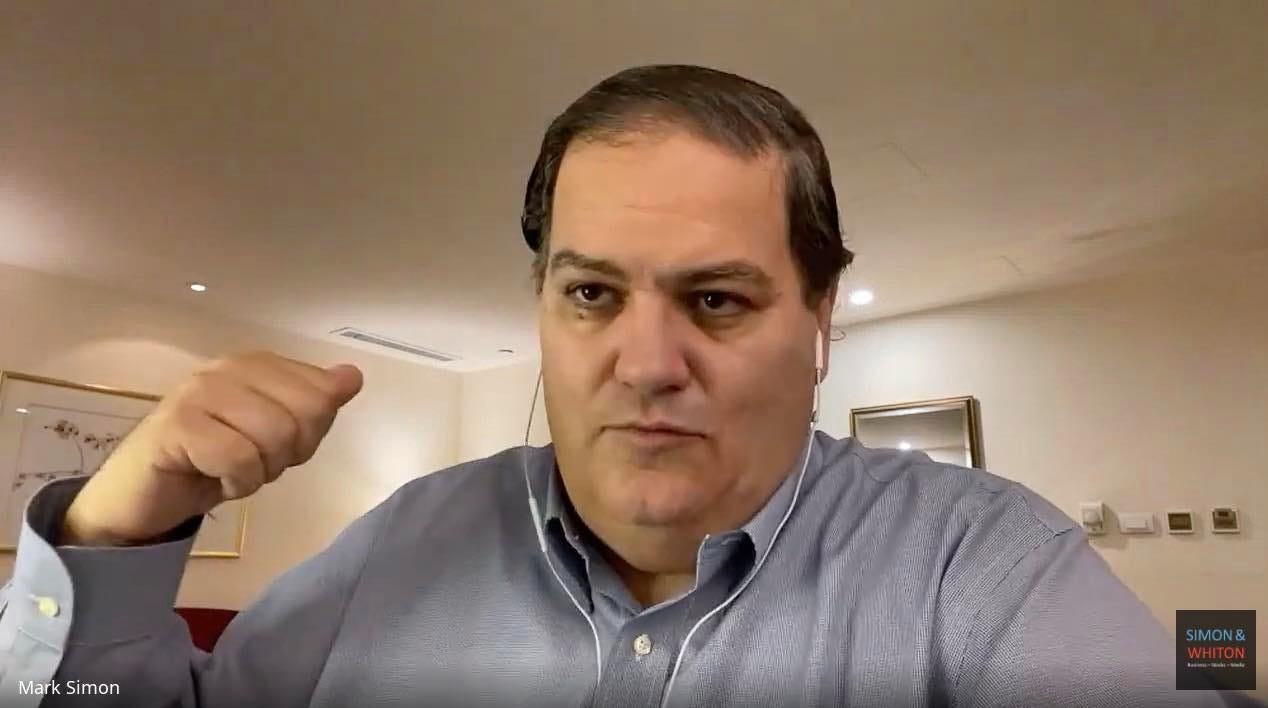Biden Continues Death Spiral (Finance Friday)
Sir Mitch bravely surrenders; Jarheads in Taiwan; censoring the Facebook censors
It was another bad week for Joe Biden, who expended part of his dwindling political capital seeking to raise the federal debt limit. For reasons that are hard to define, the Democrats think this issue works for them. Biden shouted into microphones in both Washington, DC and Michigan about Republicans threatening the government’s credit. Biden also deployed members of his cabinet to make the case. The most over the top, as usual, was Treasury Secretary Janet-from-another-planet Yellen, who predicted a recession if Congress didn’t raise the debt limit.
The reality is that Democrats could have raised the limit long ago with their majorities in both houses of Congress. However, to do so in the Senate with just 50 votes plus Vice President Harris to break the tie if anyone can find her, they must use a process called “reconciliation.” However, this mechanism can only be used so many times in a year under Senate rules, and Democrats need it for their planned spending bonanza. On that topic, Democrats are having a hard time getting their act together, despite accomplishing nothing else this year.
Most Americans don’t actually care about the debt limit, Senate rules, or whether the Treasury is late on bond payments for the first time. Everyone knows those payments and other government IOUs would be paid soon enough. Americans would however care deeply if such a development caused an economic crisis. If it did, there should be no question that they would blame the party that holds the White House and Congress.
Luckily for Biden, Brave Sir Mitch McConnell bravely ran away, clearing a path for Democrats to get back to turning America into a stagnant, socialist economy like Old Europe, with partial Republican collusion. Will Biden get a bump when Congress likely agrees to a new, still-massive, but slightly smaller-than-planned package of new spending measures? He will in the media, but unfortunately for him, this lamentable victory will soon be drowned by inflation and shortages that are getting worse, not better, thanks to government intrusion in the economy. People experience Joe Biden’s incompetence every time they overpay for gas at the pump.
That’s just the short-term problem for Biden. Over the longer-term, the tax increases he and congressional Democrats are still on track to deliver could cause the recession Yellen is already trying ham-fistedly to blame on Republicans. If you consider the tax hikes of 1990, 1993, and 2012, only the first contributed to a clear recession but the latter two helped sustain periods of prolonged economic stagnation. A slow economy plus wages being eaten by inflation will help Biden edge out Jimmy Carter on the list of worst modern presidents. He’s already well on his way, with Quinnipiac reporting Wednesday that Biden approval has plummeted to 38%. Usually presidents have to lose a war to get that low. Oh wait.
Yellen was also featured prominently arguing for a legislative proposal to require banks to report all transactions of more than $600 to the IRS. Not to worry: Yellen has assured the public that she doesn’t think it is an invasion of privacy since the IRS already does plenty of snooping around. That was actually her argument. Mind you this is not a research project: the express purpose of the new IRS power is to squeeze more money out of taxpayers. Americans unfortunately have been conditioned to the reality that in dealing with the IRS, you are guilty unless you can prove your innocence—the opposite of what the Constitution requires. Now, the requirement that the government show probable cause or get a warrant to search your property is being eroded further.
The rich don’t avoid taxes by failing to report $600 transactions; they lawfully game a complex tax code that the Democrats are about to make more complex still. But those arguments aside, having the administration advocate for this intrusion is bad politics. The optics of defending the IRS and Biden’s selection of advocates are a reminder that he doesn’t have any stars in his Cabinet, few of whose members were hired on merit.
Hunter Biden’s Private Equity Partners
Rounding out Biden’s latest bad week is China. Beijing flew scores of military aircraft into Taiwan’s air defense identification zone. While that is international airspace simply managed historically by Taiwan, the development is new and intended to be provocative. It provoked an entire statement from the administration, which asserted that America’s relationship with Taiwan was “rock solid” and left it at that. Problem solved.
When asked about the provocation, Biden said:
Look, China has, I’ve spoken with Xi about Taiwan. We agree we’ll abide by the Taiwan agreement. That’s who we are. And we made it clear that I don't think he should be doing anything other than abiding by the agreement.
The problem is there is no such agreement and Biden again looked like a fool. And keep in mind that Biden was once chairman of the Senate Foreign Relations Committee and was chosen by Barack Obama to be his veep because he had foreign policy experience. He should have this part of his portfolio down pat, and might were he not in steep mental decline.
Next, after significant hype that the liberal financial media dutifully ate up, U.S. Trade Representative Katherine Tai announced a nothing burger of trade policy on Monday. The biggest take away was a revived process for companies to get waivers on existing tariffs on China, which will be helpful to a few importers and more than a few lobbyists. Tai also stated the obvious: that China is in violation of the requirements of the “Phase One” trade deal it signed with Donald Trump. No duh, as we used to say. Some of us saw this coming even before the pandemic. The only people who thought Beijing would comply were Steven Mnuchin, Larry Kudlow, and Trump himself. (USTR was consistently hobbled in negotiations with China since Trump kept boasting a deal was imminent, signaling China which side really needed the deal and therefore had the inferior negotiating position.)
Tai inherited a modestly improving situation with China from Trump and her predecessor as trade boss, Bob Lighthizer. While we still import about $3 for every $1 in goods we export to China, that is an improvement from a 4-1 ratio when Trump won the presidency in 2016. The trade in goods deficit with China might come in just under $300 billion this year if the current run rate holds—a first since 2011.
Still, Biden has no clear trade policy. In effect, he has returned that element of national power near to where it was during the Clinton-Bush-Obama era, which is on the sidelines. It is also a de facto policy of accepting perpetual deficits and therefore continuing the over-financialization of the U.S. economy to the neglect of manufacturing, while China and the splendid moochers of Old Europe get our cash.
But hey, Biden is from Scranton, as he frequently reminds us. Before he left it at age ten, it had factories. So we’re good.
Jarheads in Taiwan
The Wall Street Journal reported that two dozen Marines have been stationed intermittently in Taiwan to train Taiwanese. The nature of their secret mission was not detailed, but it presumably includes small-unit fighting that could continue even if Chicom forces got a foothold on Taiwan’s main island of Formosa.
While tiny, this is a fundamentally important start, which reportedly began in the Trump administration. (My friend, Mark Simon, actually said last winter that he thought he spotted these guys outside of Taipei, but I wrongly assumed he was mistaking technicians working on U.S.-sold military systems for them.) If expanded, it could achieve two important goals: helping China understand the difficulty and risk in trying to conquer Taiwan and educating the American military about the quality of Taiwanese forces. The latter goal is important, because much of the U.S. military has been conditioned to believe Taiwan will not seriously resist a Chinese attack.
This defeatist view flows from places like the Kennedy School to our top military brass. It reaches far into the ranks: in a recent discussion with mid-career Marine and Navy officers, and also in a chat with an official at Special Operations Command, all said there is a widely held view in the military that Taiwan would fold rapidly. This view was also held by Trump and explained why he was never exactly pro-Taiwan, even though some in his administration were.
After the resistance we saw in Hong Kong to Beijing’s assault on freedom in that city, there should be no doubt about the political will of Taiwanese (most of whom are ethnically Chinese) to resist a takeover. Older Taiwanese who consider themselves Chinese and favored eventual unification with China have been surmounted by younger citizens who see themselves as Taiwanese and lack nostalgia for China. The crushing of freedom in Hong Kong removed any doubt as to what would happen in Taiwan if Beijing were in control—regardless of any agreement Beijing signed, since it actually signed an agreement promising freedom to Hong Kong.
But will the cultural-political will of Taiwanese to resist an assault from China manifest itself as military will—actually fighting a numerically and technologically superior force, albeit one that hasn’t fought a war since 1979, when it got its nose bloodied by Vietnam? I think it will, but the U.S. military establishment thinks it will not, despite Taiwan increasing its defense budget and buying many practical weapons that make Chinese victory far from certain. And if the U.S. military brass thinks Taiwan will fold quickly, and advises the U.S. president of that belief at the onset of war, it is highly likely to convince that president not to enter war with China. It is a self-fulfilling prophesy of defeat.
How to get around this problem? One of the best ways to reassure U.S. military brass about Taiwan’s improving military capabilities and will is through joint exercises. Prowess at simulated fighting can build confidence about what would happen during the real thing. Unfortunately, not only does the Pentagon refuse to invite Taiwan to war games despite congressional pressure to do so, it also doesn’t have much connectivity at the flag officer level. The Pentagon, which has basically been under establishment/Democrat control since Don Rumsfeld left in 2006, has failed to implement the Taiwan Travel Act of 2018 which calls for such interaction. What we really need to multiply power in the Pacific to deter war—a joint military command with Taiwan, Japan, and the USA plus lots of practice together—is just a dream. We have great connectivity and practice frequently with the militaries of Belgium, Denmark, Holland, and others who are irrelevant to today’s world while we neglect the most dangerous part of the world.

China in Economic Crisis?
The economic crisis in China seems to be spreading. On Thursday, bonds for Sunac and Kaisa Group plummeted. Both companies are real estate development companies similar to Evergrande, which previously defaulted on its debt. Fantasia missed a $206 million payment on Monday; Fitch downgraded that company and Sinic Holdings this week. This looks a lot like broad contagion spreading through the house of cards that is the Chinese real estate market. While Evergrande’s default caused a selloff on U.S. markets, these more recent developments have been ignored by markets outside of China. Should they be? Nikkei Asia reported this week that economists believe Chinese GDP slowed to an annualized rate of 5% in the quarter that just ended. If true and more than a blip, this could be the long-awaited faltering of the Chinese model. Maybe.
Both Kinds of Rates Go Up
New Zealand became the second wealthy economy after South Korea to raise interest rates. Brazil has also hiked rates that it cut as the pandemic halted economic activity last year. Brasilia has increased its benchmark to 6% from a low of 2%. What this means is that more central banks are realizing what our Federal Reserve has not: that inflation is real, as is the risk for sustained higher inflation, and notwithstanding the dreams of progressive Karenistas to prolong the epidemic indefinitely, the crisis is over.
Absent other factors, higher interest rates should have caused the currencies of those countries to appreciate against the dollar. But that didn’t happen, and the dollar has been gaining strength. Despite the chaos and socialism running rampant in Washington, investors still see the USA as the place to do business and invest. For now.
Of course, not wanting to keep money in New Zealand is entirely understandable. The country, whose largest city has remained in lockdown for more that 50 days despite negligible coronavirus numbers, is second only to Australia in refusing to accept the realities of a world with coronavirus. Australia recently announced it will not allow tourists to the country until 2022, which realistically will include most business travelers as well. When in 2022 is anyone’s guess. Various Australian cities are in the midst of an indecipherable process to ease lockdowns that change daily. New Zealand has a leftwing government, but what is Australia’s excuse? The uncontested fear and paralysis on display there indicates something very unflattering has crept into Australia’s culture. Are they becoming the Scandinavia of the Pacific, rich but pointless?
In contrast, Singapore is moving ahead with plans to get back to normal, although with a slowdown due to a spike in new WuFlu cases. The government there kept cases and deaths to near zero, but with high vaccination rates and the understanding that a trade entrepot cannot remain closed to the world, it has liberalized and begun reopening to vaccinated visitors from Germany and a small number of other places. Officials say the USA will likely be added this winter. Unrelated to travel, cases have recently spiked in Singapore, although hospitalizations and deaths remain very low. This shows what other East Asia countries have to do to restore normalcy: prepare their publics for an unavoidable but manageable increase in cases and gradually restore travel with important trading partners. Otherwise, with 1.5 years of isolation and counting, they risk being left behind as global business looks elsewhere.
The Facebook
Henry Kissinger once said of the Iran-Iraq War, “It’s a pity both sides can’t lose.” So it was when Frances Haugen leaked unflattering documents she stole from Facebook to attack her former employer. Using that Orwellian term the modern Left loves to deploy to abridge freedom, she claimed that Facebook puts profits ahead of “safety.” Facebook basically replied with a pathetic, “No we don’t!”
As I argued on “Mornings with Maria” on Fox Business, all of these people are horrible and deserve each other. Facebook chose to be in the censorship business, which means it is not a network like the phone system, on which you can say anything. Rather, it is in the influence business, and this is what a faux network gets when it goes down that path.
Haugen, for her part, is arguing for more censorship—on everything from politics to pictures of models with hard-to-achieve bodies. Facebook and others in Big Tech should have given consumers the tools to screen content they don’t like (e.g., conservative views, progressive views, size 2 models, anything other than pictures of cats), but decided they knew better than the peons who consume their now-“curated” content.
Absent from the debate is any mention of the fundamental American belief that free people are better positioned to judge the quality of information and opinions than a self-appointed elite. Democrats, progressives, and the media all cheered Haugen and would love for Big Tech to censor more speech since its censorship always favors the Left. What I have yet to see is a serious Republican proposal to give a future Republican administration the power to put an end to this mess and break up Big Tech. Anybody home?

Trump’s HR Department
I’ve previously written about the complete disaster that was staffing in the Trump administration. While Trump had many skills and fundamentally redefined the Right for the better, his inability to choose people with the will and capability to execute his vision was a wonder of the world. (Exceptions like Mike Pompeo prove the rule.) Illustrating this reality in the National Interest, Mark Episkopos asks why Fiona Hill ever joined the Trump administration. You may recall her as the English-accented senior director at the National Security Council overseeing Russia policy who testified against Trump in his 2019 impeachment. Her new book makes clear she disagreed with Trump’s policy and shared the neoliberal national security establishment’s failed assessment of Russia. So why join up? She was brought onto the NSC staff by pointless H.R. McMaster and kept on by John Bolton.
Unlike the highly credentialed, Harvard-blue-pilled Hill, Episkopos offers a prescient assessment of Russia and Putin:
As part of her effort to demonstrate the supposed parallels between Trump and Putin, Hill shoe-horns the Russian leader into a nationalist-populist frame in which he simply does not belong. Consider the bigger picture of Putin’s rule. In all its varied forms from the Tsardom to the Soviet Union, the Russian imperial project has been—and continues to be, under Vladimir Putin—a quest to carve out a multinational, multi-confessional empire straddling large swathes of the Eurasian heartland. Since fully consolidating power in the mid-2000s, Putin has consistently repressed, not stoked, nationalist-populist movements and attitudes in Russia. Far from “fueling nationalist grievances,” Putin has de-emphasized Russian nationhood for the sake of a supranational imperial identity.
Mediocrity of the Week
Canadian Prime Minister Justin Trudeau could actually be the mediocrity of the year or decade, but we’ll start with just the week. As brought to my attention by Cousin Phil, Trudeau tweeted out:


I had to check more than once to make sure it wasn’t a parody account. In fact, it actually does belong to the sock model and Bollywood wannabe that occupies the head of government job in Canuckistan.
As a gay guy who resents being lumped into a group to serve some progressive losers’ lust for power, I can’t even stomach “LGBT.” In particular, I’m dubious about the “Ts” hitching their wagon to the “Gs,” although the “Ls” sure are handy if you need to gap a spark plug or borrow an oversized flannel for the big camping trip. Nonetheless, I forced myself to look up 2SLGBTQIA+, which the Subcommittee on Queer People at McGill University says refers to “Lesbian, Gay, Bisexual, Trans, Queer, Two-Spirit, Intersex, and Asexual peoples.”
What to make of this? The red-pilled rapper Zuby summed up the absurdity best in replying to Trudeau:
Headbutting the keyboard is now a sexuality.
Have a great weekend and Columbus Day!







